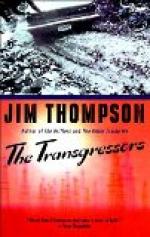The widow is at home. In a few words Martha tells her what she must do if she would save the life of the men who rescued her boy and herself from the sheriff.
“Do you have to ask me twice to help you?” cries the woman. “I would lie down on the track and let the cars run over me if it would protect Mr. Trueman.”
Martha and her ally start for the long grade. On the way they discuss the manner in which they may derail the car with the nitro-glycerine.
“We will put rocks on the track,” suggests Sister Martha. “But the miners will see us;” objects the widow, “it won’t be dark when the train arrives.”
“I heard the miners say the train would be late. A freight was off the track east of Mathews and the wrecking crew was at work,” Martha goes on to explain.
When the rescuers arrive at the track they realize that in their haste they have neglected to bring a lantern, the one thing that may be needed to signal the train, for now a dilemma confronts them. If they place a pile of rocks on the track, the train may reach that point before the car of destruction, and in this event the obstruction will cause the wrecking of the train.
The roadway is along the side of the mountain.
On one side of the tracks the rocks rise in a sheer wall; on the other is a steep embankment that in places is almost as precipitous as the crags above.
“We will have to separate,” Martha advises. “You go up the track. No, I will go up and you down. If it is possible, you must stop the train. I will wait till the last moment and then put rocks on the track. When you see Mr. Trueman, tell him to hasten to the Purdy house, for Ethel is in great danger. Tell him I will be there to aid him in pacifying the miners.”
“But you can never pile rocks enough on the track to stop the car,” Widow Braun says compassionately, glancing at the frail form before her.
“Have no fear. I can do my part of the work. God will give me strength. And you, He will guide you, as well. Come, let us set about our work.”
With a parting blessing from Sister Martha, the widow hurries down the track. She can discern the station five miles below at the beginning of the ten-mile grade. This station is her objective. If she can reach it before the arrival of the express, the life of Harvey Trueman and those of all the passengers will be saved.
The nature of her mission gives her strength to travel over the rough roadbed with incredible speed. Her eyes are upon the station, which momentarily becomes more and more indistinct; she knows that if the train starts up the grade she can see the headlight. Her lips move in an articulate prayer that she may not see the light. So absorbed is she in the thought of how to stop the train in the event of its passing the station that she fails to see a culvert bridge. At the bridge the roadbed terminates and a trestle carries the tracks for a distance of fifteen yards. The culvert is dry nine mouths in the year, and is a raging mountain torrent only in the spring.




